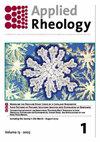How quarry waste limestone filler affects the rheological behavior of cement-based materials
IF 5.8
4区 工程技术
Q1 MECHANICS
引用次数: 17
Abstract
Abstract The main objective of this work is to highlight experimentally the effect of quarry waste limestone fillers (LF) on the rheological properties of concrete. All mixtures were made with water-to-cement ratio (W/C) of 0.50. The method adopted based on the rheological behavior of concrete incorporating LF as a partial substitute for sand in multi-scale systems (concrete, mortar, grout and LF suspension). The replacement ratio of sand by LF ranged from 0% to 20% (by weight of sand) in concrete and mortar. Whereas, the addition of LF varied from 0% to 60% (by weight of cement) in cement grout. The rheological behavior of concrete and mortar was modeled by the Bingham model with sufficient precision. However, the cement grout shows a nonlinear behavior, which was modeled by the Herschel-Bulkley model. Results indicate that the use of LF has a significant effect on the superplasticizer (Sp) demand of concrete and mortar, for a given slump on one hand. On the other hand, an increase in yield stress, apparent viscosity and flow time of cement grout was obtained when LF is incorporated, which results in a loss of fluidity of the suspensions of LF.采石场废石灰石填料如何影响水泥基材料的流变性能
摘要本工作的主要目的是通过实验强调采石场废弃石灰石填料(LF)对混凝土流变性能的影响。所有混合物的水灰比(W/C)均为0.50。该方法基于混凝土的流变行为,在多尺度系统(混凝土、砂浆、灌浆和LF悬浮液)中掺入LF作为砂的部分替代品。LF对混凝土和砂浆中沙子的替代率为0%至20%(按沙子重量计)。而LF在水泥浆中的添加量从0%到60%不等(按水泥重量计)。混凝土和砂浆的流变行为采用宾厄姆模型进行建模,具有足够的精度。然而,水泥浆表现出非线性行为,这是由Herschel-Bulkley模型建模的。结果表明,对于给定的坍落度,LF的使用一方面对混凝土和砂浆的高效减水剂需求量有显著影响。另一方面,掺入LF后,水泥浆的屈服应力、表观粘度和流动时间增加,导致LF悬浮液的流动性损失。
本文章由计算机程序翻译,如有差异,请以英文原文为准。
求助全文
约1分钟内获得全文
求助全文
来源期刊

Applied Rheology
物理-力学
CiteScore
3.00
自引率
5.60%
发文量
7
审稿时长
>12 weeks
期刊介绍:
Applied Rheology is a peer-reviewed, open access, electronic journal devoted to the publication in the field of applied rheology. The journal provides the readers with free, instant, and permanent access to all content worldwide; and the authors with extensive promotion of published articles, long-time preservation, language-correction services, no space constraints and immediate publication.
 求助内容:
求助内容: 应助结果提醒方式:
应助结果提醒方式:


